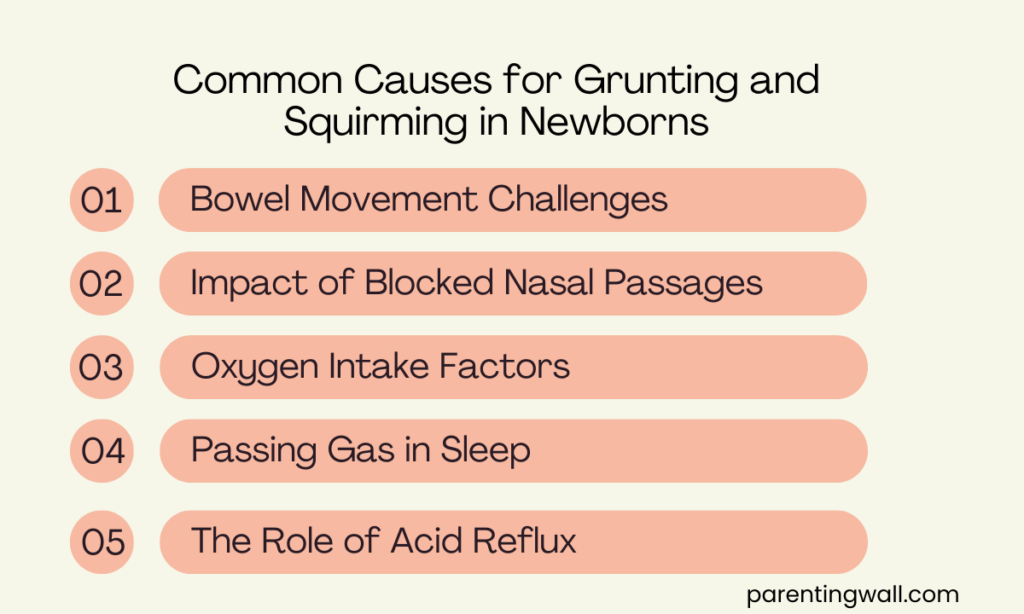As a new parent, you want to do everything you can to make sure your little one is happy and healthy. One thing that might be keeping you up at night is the sound of your newborn grunting and squirming while sleeping. Don’t worry; it’s perfectly normal! In this blog, we’ll cover everything you need to know about why newborns grunt and squirm in their sleep.
Here you find answers of all your questions regarding common causes, expert solutions, when to concern and lot more thing about newborn grunting and squirming while sleeping.
Why Do Newborn Grunting and Squirming While Sleeping?
The newborn often makes grunting sounds while sleeping, and it’s quite common. These noises are usually a result of the baby’s developing abdominal muscles.
It’s fascinating to think that these little newborn grunting are linked to the growth of their digestive system and the narrowness of their nasal passages. Noisy breathing during active sleep is just another one of those normal sounds the newborn makes.
Throughout sleep, the newborn often produces grunting sounds, which might be a sign of respiratory distress. Additionally, lip smacking during sleep could suggest reflux. The occurrence of nasal grunts during active sleep is common, contributing to noisy breathing.
To mitigate baby grunts, consider using a nasal aspirator to clear mucus. Familiarizing oneself with these sounds can help ease anxiety for new parents.
Common Causes for Grunting and Squirming in Newborns

Grunting and squirming during sleeping, newborns may be a result of constipation. These actions could also be prompted by discomfort or congestion. If there’s an airway obstruction, whether due to mucus or other factors, seeking medical attention is advisable.
The adjustment of stomach muscles during sleep could contribute to grunting baby syndrome. Additionally, the presence of mucus in their nasal passages might be another factor to consider.
1. Bowel Movement Challenges
Managing grunting baby syndrome involves understanding newborns’ struggle with bowel movement during sleep. Relieve discomfort by assisting newborns with constipation and alleviating grunting.
Abdominal discomfort during bowel movement can result in grunting, requiring attention to help newborns pass stool comfortably. This process ensures improved sleep quality for the little ones.
2. Impact of Blocked Nasal Passages
Blocked nasal passages in newborns can lead to grunting and discomfort during sleep. It’s important to clear mucus from the baby’s nostrils, as this can alleviate grunting caused by nasal congestion.
Using a nasal aspirator can help reduce the impact of a stuffy nose on your baby’s sleep. Nasal congestion might make your newborn restless during sleep, but clearing the nasal passages can make a significant difference.
3. Oxygen Intake Factors
Newborns regulate oxygen intake, possibly causing grunting baby syndrome. It could also be linked to respiratory syncytial virus and asthma.
Additionally, grunting might indicate respiratory distress syndrome, emphasizing the need for monitoring breathing patterns to identify potential issues.
4. Passing Gas in Sleep
Gassiness in newborns can lead to grunting baby syndrome during sleep due to difficulty passing gas. This discomfort is caused by digestive issues, requiring parents to assist their babies in alleviating gas, which can improve their sleep quality. Monitoring and addressing the reasons behind grunting can help relieve any related discomfort.
5. The Role of Acid Reflux
Grunting and discomfort in newborn sleep can be linked to gastroesophageal reflux disease. Acid reflux in newborns may cause the grunting baby syndrome, leading to restless sleep.
The acidity in the newborn’s stomach can result in grunting and discomfort during sleep. It’s important for parents to be aware of the potential role of acid reflux in causing these sleep disturbances.
Expert Solutions to Soothe Grunting and Squirming Babies
Creating a calm nursery environment can alleviate grunting baby syndrome in sleep. Utilizing a bassinet or crib with a slight elevation can lessen grunting in newborn sleep.
Consulting a pediatrician can provide peace of mind about grunting baby syndrome, implementing soothing bedtime routines and maintaining a quiet sleep environment can reduce grunting and squirming in newborn sleep.
1. Optimizing the Sleeping Environment
- Create a serene sleep setting for newborns by ensuring a dark and quiet environment.
- Use a white noise machine to promote sound sleep, and provide a safe and comfortable crib or bassinet.
- Establish a consistent sleep routine and swaddle the newborn to enhance their sense of security during sleep.
2. Benefits of Anal Stimulation
- Stimulating the anus gently can assist newborns in regular stool passage, aiding in relieving constipation and facilitating bowel movements.
- Effective anal stimulation may alleviate discomfort and contribute to healthy digestion, promoting overall well-being.
- This practice aligns with the recommendations of the American Academy of Pediatrics and can be beneficial for newborns’ pelvic floor and stomach muscles.
3. Effective Baby Massages
- To promote relaxation and aid digestion in newborns, gentle clockwise massage of the tummy muscles is recommended.
- These soothing techniques can ease discomfort and contribute to better sleep quality for babies.
- Gradually introducing calming massage techniques can significantly benefit a baby’s wake window, nurturing their overall well-being.
4. Techniques to Clear Nasal Passages
- To clear newborns’ nasal passages, use a nasal aspirator for mucus removal.
- Employ steam therapy and perform nasal massage to alleviate congestion.
- Keeping newborns in the right position an upright position aids in nasal passage clearance, and humidifying the air relieves congestion.
5. Adjustments in Feeding Practices
- Frequent burping during and after feedings helps newborns.
- Offering smaller, more frequent feedings reduces reflux.
- Avoid overfeeding to prevent discomfort during sleep.
- Keep newborns in an upright position for digestion.
- Adjust breastfeeding positions for better digestion and airflow.
When Should Parents Be Concerned About Newborn Grunting?
If you notice irregular breathing patterns or respiratory distress in your newborn while they are grunting, it may be a cause for concern.
Additionally, keep an eye out for signs of gastroesophageal reflux disease and persistent grunting accompanied by bowel movement issues. Watch for any signs of discomfort or distress in your baby during grunting.
Signs of Serious Respiratory Issues
During a newborn’s sleep, observe for rapid or noisy breathing. Prolonged grunting may indicate distress. Watch for signs of respiratory distress like nasal flaring and irregular breathing patterns, including pauses in breathing. Seek medical attention if persistent grunting is accompanied by respiratory distress.
Recognizing Symptoms of Sepsis and Meningitis
Fever in newborns may indicate sepsis, while symptoms of meningitis include irritability and poor feeding. Watch for signs of lethargy, poor responsiveness, or unusual crying. Immediate medical attention is crucial for newborns showing these symptoms. Monitor closely for any changes in behavior or responsiveness, ensuring early detection and intervention.
Detecting Heart Problems Early
By monitoring newborns’ breathing patterns for signs of distress, parents can detect potential heart issues early. Additionally, observing for bluish discoloration of the skin, abnormal heart sounds, irregular heartbeats, and signs of poor feeding or rapid breathing are crucial. Seeking prompt medical evaluation for any concerning heart-related symptoms is essential for early detection and management of potential heart problems.
FAQs About Newborn Grunting
Are grunting sounds typical for newborns during sleep? What are the potential causes of newborns squirming during sleep? How can parents distinguish between normal newborn grunting in sleep and distress? When should parents seek medical advice for newborns’ grunting and squirming? What are some effective strategies to soothe newborns experiencing discomfort during sleep?
When Should I Worry About My Newborn Grunting?
If your newborn grunting in sleep, it is usually normal. However, if accompanied by respiratory distress or irregular breathing, seek medical attention. Grunting may indicate underlying respiratory issues that need to be addressed by a pediatrician. Consult a healthcare professional for peace of mind and evaluation if persistent grunting occurs.
How to Differentiate Between Normal and Unusual Noises Made by Babies While Sleeping?
Understanding the various sleep sounds babies make is essential for new parents to distinguish between typical noises and signs of discomfort. While grunts and whistling can be normal, it’s important to monitor for distress. Differentiating between regular newborn sleep sounds and those indicating discomfort can help address their needs effectively.
What Should I Do To Help My Baby Sleep Better?
To help your baby sleep better, create a soothing sleep environment with white noise, night light and consistent routines. Use a nasal aspirator to clear their nasal passages and alleviate congestion. Promote good sleep hygiene by swaddling and ensuring a comfortable sleep surface. Address discomfort related to acid reflux or bowel movements, as it can impact sleep quality. Support their sleep by addressing potential sources of discomfort like mucus or acid reflux.
Is it Normal for Newborns to Squirm in Their Sleep?
Newborns often squirm in their sleep, which is typically a sign of the baby transitioning between sleep cycles. This behavior is considered normal as it is a natural occurrence during active sleep phases. Understanding newborn sleep patterns and behaviors can help parents differentiate between normal and unusual movements during sleep.
How Do I Get My Newborn Baby to Sleep in a Crib?
To help your newborn sleep in a crib, establish a consistent bedtime routine. Place them in the crib when they’re drowsy but still awake. Use a firm mattress with no loose bedding or toys. Consider using white noise or swaddling to create a soothing environment.
What Sounds Do Babies Make While Sleeping?
Babies make various sounds while sleeping, such as grunting, snuffles, and lip smacking. These noises are normal and indicate different sleep stages. Understanding these sounds helps parents differentiate between regular sleep noises and signs of discomfort. Familiarizing yourself with the range of sleep sounds supports parental confidence in newborn sleep behaviors.
Conclusion
To provide a peaceful and comfortable sleep environment for your newborn, it’s important to understand the reasons behind their grunting and squirming. It is normal for newborns to make various sounds while sleeping, including grunting and squirming.
These sounds can be a result of bowel movement challenges, blocked nasal passages, oxygen intake factors, passing gas, or acid reflux. To soothe your baby and promote better sleep, you can optimize their sleeping environment, provide anal stimulation, practice effective baby massages, clear nasal passages, and make adjustments in feeding practices.
However, if you notice any signs of serious respiratory issues, sepsis, meningitis, or heart problems, it is important to seek medical attention. Remember, every baby is different, and if you have any concerns or questions regarding your newborn’s sleep patterns, it’s always best to consult with a pediatrician.



